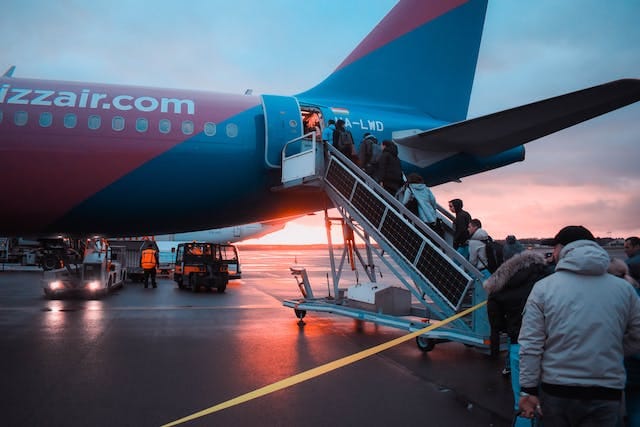Aircraft, with their complex engineering and advanced technology, depend on a variety of components to operate smoothly. One often overlooked yet critical aspect of ensuring aviation safety and efficiency is the quality of the tires that support these large machines. The significance of high-quality airplane tires cannot be emphasized enough, as they play a pivotal role in ensuring safe takeoffs, smooth landings, and overall operational success.

Safety in the Skies
The safety of air travel is of utmost importance, and every component of an aircraft contributes to this crucial aspect. High-quality tires are specifically designed to withstand the immense pressures and temperatures experienced during takeoff and landing. The forces exerted on an aircraft during these phases are substantial, and the tires must endure them without compromising structural integrity. In situations like emergency landings or landings on less-than-ideal surfaces, the reliability of aircraft tires becomes even more apparent.
Well-constructed tires can prevent blowouts and other failures, reducing the risk of accidents and ensuring the safety of passengers and crew. This critical role underscores the tire’s significance in mitigating potential hazards and upholding the highest standards of aviation safety, underscoring its indispensable role in safeguarding human lives during air travel.
Efficiency and Performance
Beyond safety, the quality of airplane tires significantly influences operational efficiency and performance. Efficient takeoffs and landings are essential for timely arrivals and departures, and premium tires contribute to the smooth execution of these maneuvers. The precision provided by these tires enhances overall operational efficiency, minimizing delays and optimizing flight schedules.
Fuel efficiency is another critical factor affected by the quality of airplane tires. Adequately inflated and properly maintained tires minimize rolling resistance, facilitating the aircraft’s taxiing and movement with reduced exertion. This, in turn, leads to fuel savings, not only benefiting airlines economically but also contributing to environmental sustainability in the aviation industry. The conscientious use of high-quality tires underscores a commitment to both operational excellence and responsible aviation practices.
Adaptability to Varied Conditions
Aircraft operate in diverse environments and weather conditions, spanning scorching heat to cold and dry runways to snow-covered landscapes. High-quality tires are meticulously crafted with these challenges in mind, incorporating features that enhance performance across a wide range of conditions.
Tread design, material composition, and advanced technologies such as anti-skid systems contribute to the adaptability of airplane tires. This adaptability ensures that airplanes can operate safely and efficiently regardless of external factors, making these tires an indispensable asset for the aviation industry’s unwavering commitment to passenger safety and operational excellence, reinforcing their pivotal role in the dynamic landscape of aviation technology.
Load-Bearing Capacity
Aircraft tires bear substantial pressure during takeoffs and landings, managing the aircraft’s weight and cargo. High-quality tires are meticulously engineered to efficiently manage these loads, preventing failures under pressure. The load-bearing capacity directly impacts the aircraft’s ability to manage diverse conditions such as varying weather, runway surfaces, and the overall stress of flight operations.
Adequate load-bearing capacity prevents tire failures, enhances braking efficiency, and supports optimal weight distribution, contributing to safer landings and smoother taxiing. Airlines and aviation authorities prioritize high-quality tires to guarantee the structural integrity of an aircraft under diverse loads, underscoring the indispensable role these components play in aviation safety.
Improved Braking Performance
Top-tier airplane tires significantly enhance an aircraft’s braking capabilities. During the critical landing phase, effective braking becomes imperative for achieving a smooth and controlled deceleration. Meticulously designed tires equipped with advanced braking technologies ensure an optimal grip on the runway, facilitating precise control and mitigating the risk of skidding or sliding. This heightened braking capability not only bolsters safety during landings but also contributes to the overall operational efficiency of the aircraft.
Noise Mitigation for Enhanced Passenger Comfort
Airplane tires also play a pivotal role in mitigating noise levels during both takeoffs and landings, thereby enhancing the overall comfort of passengers. High-quality tires are meticulously engineered with features that minimize the noise generated as the aircraft makes contact with the runway. This not only elevates the in-flight experience for passengers but also aligns with the aviation industry’s steadfast commitment to environmental sustainability by addressing concerns related to noise pollution near airports.
Conclusion
Within the intricate framework of aviation technology, every element plays a pivotal role in guaranteeing the safety and efficiency of air travel. High-quality airplane tires serve as a testament to the aviation industry’s commitment to prioritizing the well-being of passengers and the success of operations. As technology advances and aviation standards evolve, the significance of investing in top-tier tires becomes even more apparent, solidifying their place as a fundamental element in the world of aviation.




Recent Comments